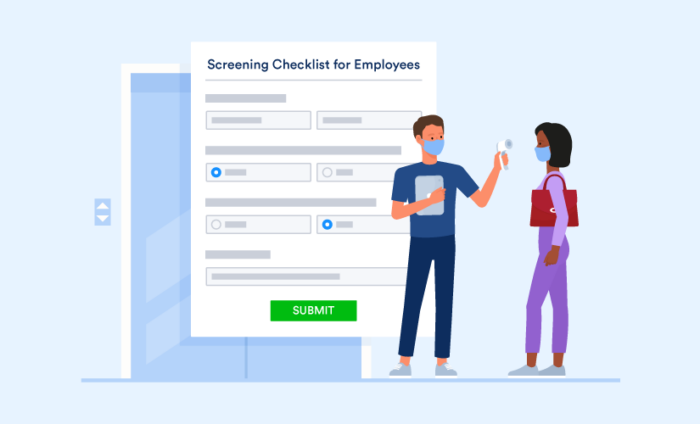State and local governments are phasing out shelter-in-place orders, which means that nonessential businesses have the opportunity to reopen their doors. While many people are hoping for things to return to the way they were before the pandemic, it looks like the “new normal” is going to stick around for a while.
Reopening a business in the era of COVID-19 comes with complications that business owners must face. Consumers’ spending behavior has changed, and employers are carrying a greater responsibility to keep everyone safe.
Not only do you need to implement new cleaning and sanitation practices, but it’s essential to consider how you can minimize the risk of an employee bringing the virus into the workplace.
Legal implications of employee health screenings
Is it legal for employers to require employee health screenings? The Equal Employment Opportunity Commission (EEOC) does, in fact, allow employee COVID-19 screenings in order to minimize a direct threat to other employees.
Under the Americans with Disabilities Act (ADA), employers can screen employees during the pandemic for potential symptoms. The EEOC continues to issue updates about best practices for honoring ADA obligations while following guidelines laid out by the Centers for Disease Control and Prevention (CDC).
If you implement employee screenings, make sure the policy applies to all staff members. Selective screening could put your company at risk of a discrimination claim.
Additionally, you must maintain the confidentiality of all employee health information. Not only is it a violation of the Health Insurance Portability and Accountability Act (HIPAA) to disclose information regarding an employee’s symptoms to unauthorized individuals, but sharing information about a lack of symptoms could also be a HIPAA violation.
Pro Tip
Keep your business safe as it reopens. Create a COVID-19 self-screening questionnaire with Jotform to ensure the safety of your community.
Two-step screenings for employees
During the pandemic, employers should implement a multistep approach to identify employees who might have the virus. Screening practices can include temperature checks and symptom questionnaires that match the list the CDC provides.
The best practice is to have each employee complete a questionnaire before returning to the workplace. Digital forms simplify this process, giving employees the flexibility to complete the questionnaire on the device of their choice. If an employee has no COVID-19 symptoms, they can arrive for their shift and complete a quick onsite temperature check.
Employee health screening questions
Not only do you need to ask employees about their current symptoms, but you should also inquire about their exposure to people with the virus. Consider the following questions for your COVID-19 employee health screening form.
- Do you have any symptoms of COVID-19? Check all that apply:
- Fever
- Cough
- Headache
- Fatigue
- Shortness of breath
- Nausea
- Diarrhea
- Congestion
- Sore throat
- Loss of taste or smell
- Have you been in contact with anyone who has the symptoms listed above?
- In the past two weeks, have any of your household members received a positive COVID-19 test?
- Have you traveled to a high-risk area in the past two weeks?
- Are you or a household member waiting for a COVID-19 test result?
If an employee has any COVID-19 symptoms, that person should quarantine at home, according to CDC recommendations.
Online forms for COVID-19 screening
If you’re wondering how best to screen employees returning to work, Jotform offers the digital forms you need to streamline this process. These online forms are accessible from any location, offering employers an effective solution to gather employee information.
Jotform provides business owners with templates such as
- Self-screening forms
- COVID-19 guidance for staff
- Self-quarantine employee leave form
- Screening checklist for visitors and employees
- Contingency plan checklist
Your business can customize the questions to match the needs of your industry.
Employee screenings must happen regularly. Conducting screenings with paper forms is unwieldy and not necessarily safe. Digital forms give you a contactless way to collect data from employees and make it easier to organize that data. Your team can take an active role in minimizing the spread of the virus.
Everyone must do their part
Even though employee health screenings might seem like a nuisance, they are a necessary step to keep your business open. Minimizing the risk of a COVID-19 outbreak means that you can continue offering services to your customers.
Plus, everyone plays a role in managing this pandemic. A few changes in the workplace not only protect employees, but they also help to keep the virus from spreading to vulnerable members of the community.








































Send Comment: